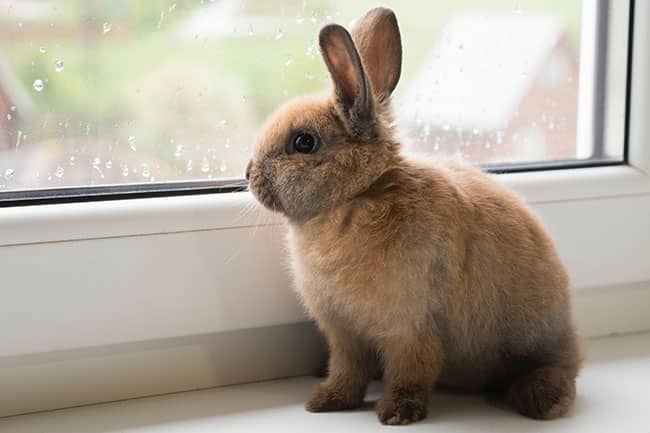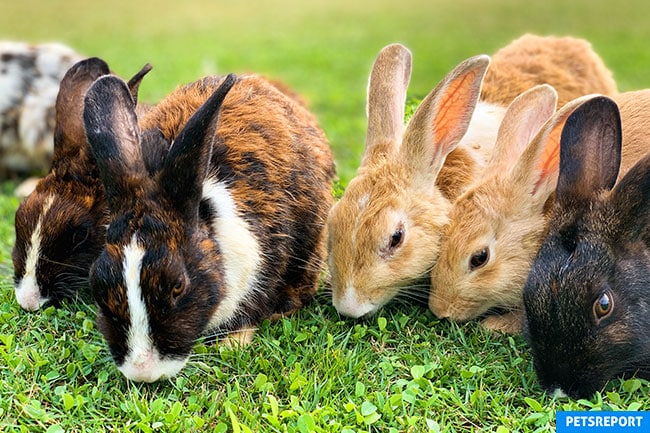Rabbits, much like dogs and cats, make great household companions. With their ridiculously soft, cuddle-perfect coats and sweet personalities, these fuzzy creatures are simply fun to have around. Rabbits are undoubtedly one of the crowd favorites for household pets. Unfortunately, our adorable long-eared friends are prone to a number of diseases and health problems.
Although most diseases common to rabbits are not a cause for worry, it’s essential to have a good understanding of the signs and causes of rabbit illness so that you can give appropriate aid to your furry pal when they need it.
Here are some of the most common rabbit illnesses to look out for:
1. Hairballs
Our adorable hoppers spend a good portion of their day self-grooming. While their grooming behavior is naturally healthy, rabbits tend to over-groom sometimes, causing them to ingest a lot of fur. With improper digestion, ingested fur can clump in their stomach, forming hairballs.
As rabbits cannot expel hairballs through vomiting, too much buildup can cause a blockage in the gastrointestinal system leading to gut pains and stomach infection.
What to do about hairballs in rabbits:
Avoid hairballs by regularly brushing your bunny’s coat and giving them access to plenty of clean water. Supplements to aid in digestion can also help in breaking down ingested hair.
2. Teeth Overgrowth
Rabbit teeth continue to grow throughout their life. As such, regular teeth trimming is a must for pet rabbits. Overgrown teeth are tough to handle. It can cause painful mouth infections, making it difficult for your pet to eat.
What to do to prevent teeth overgrowth in rabbits:
While overgrown teeth cannot be totally prevented, you can avoid injuries and infections by giving your rabbit enough fiber to chew on such grass or hay and regularly bringing them to the vet for dental checkups.
3. Ear Mites
While rabbits’ adorable ears are part of their charm, they are highly susceptible to ear mites.
Ear mites are insects that feed off ear wax and oils that rabbit ears produce. Infected rabbit ears tend to look inflamed and crusty. Watch out for signs of ear mites infection such as head shaking, drooping ears, and incessant scratching.
How to treat ear mites in rabbits:
Ear mites might be a nuisance, but they’re relatively easy to treat and avoid. Once symptoms show up, bring them to the vet for proper treatment. Do not let it go untreated, as infections from ear mites can lead to bacterial growth and fungal infections.

4. Uterine Cancer
Unspayed female rabbits are at a very high risk of developing reproductive tumors, and unfortunately, the mortality rate is incredibly high for rabbits afflicted with this disease.
How to prevent uterine cancer in rabbits:
It is recommended to spay or neuter pet rabbits at 4 to 6 months old to prevent reproductive cancers and any form of abnormal growth. Once the surgery is done, chances of your rabbit developing uterine cancer drop down to zero.
5. GI Stasis
Gastrointestinal Stasis or GI stasis is a life-threatening bacterial disease when a rabbit’s gut slows down or stops working, making it difficult for food or hair to pass through. This disease requires immediate treatment. If no proper attention is given within 2-3 days, it may not be possible for your rabbit to survive.
How to spot gastrointestinal stasis in rabbits:
Common symptoms of GI stasis include lack of appetite, loud stomach noises, diarrhea, lethargy, and a hunched posture. It can be prevented by scheduling regular vet visits and giving your rabbit plenty of water, hay, and exercise.
6. Rabbit Haemorrhagic Disease Virus (RHDV)
RHDV is spread by mosquitoes, flies, or direct contact with an infected rabbit.
This deadly disease may progress rapidly from fever to body weakness to death within a few days from infection. It can be challenging to detect as most rabbits will show no external symptoms of RHDV within the incubation period. Signs to look out for include loss of appetite, restlessness, weakness, and fever.
What to do about RHDV in rabbits:
It is essential to get the proper vaccine every six months for adult rabbits as a preventive measure. Younger rabbits can be vaccinated at around four weeks of age, repeatedly until their 12th week, and then every six months.
Rabbits Need Attention
Rabbits are adorable yet frail creatures; they require a good amount of care and attention daily. As a responsible pet owner, always be on the lookout for any changes in your furball’s behavior. If you sense anything concerning your pet, do not hesitate to call your vet. The earlier health issues are detected, the easier they are to treat, giving your fluffy friend a better shot at a long, happy, and healthy life.


Leave A Comment